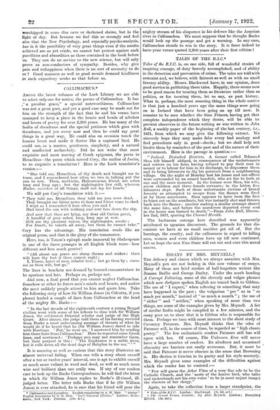TALES ap THE R.LC.* Tales of the B.I.C. is, on
one side, full of wonderful stories of inspiring courage, of -duty bravely accomplished, and of ability
in the detection and prevention of crime. The tales are told with restraint and, we believe,-with fairneds as well as with no small literary ability. Messrs. Blackwood have, in our opinion,:done good service in publishing these tales. Happily, there'seems now to be good reason for treating them as literature rather than as
polities, or -for treating them, let us say, as past history. What is, perhaps, the most amazing thing in the whole matter is that just a -hundred years ago-the•same things were going on in Ireland that have been going -on up till now. It remains to be seen whether the Sinn Feiners, having got that complete independence :which they desire, will be able to prevent observers in the future'writing as was written in John Bull, a weekly paper of the :beginning of •the last century, i.e.,
1821, from which we may -give the following extract. We sincerely hope they may make false every bad analogy -and find precedents only in good—deeds ; but we shall help not hinder them by reminders of the past and of the nature of their environment. Here is the passage in question :—
" Ireland. Disturbed Districts. A farmer called Edmund Shea felt himself obliged, in consequence of the undertenants and cotters on his farm having refused to pay their rent in money or to labour for him in its discharge, to dispossess them and to bring labourers to dig his potatoes from a neighbouring village. On the night of Monday last his house and out-offices were surrounded by an armed banditti, who set fire to both at one and the same moment. In the former were Shea, his wife, seven children and three female servants ; in the latter, five labourers slept. Such of these unfortunate victims of brutal ferocity as attempted to escape from the flames were fired at by those miscreants. Shea appears to have been the first • to burst out on the assailants, but was instantly shot and thrown back into the flames ; another making a similar attempt shared the same fate, and before the murderers departed every soul in the house was burned to death."—From John Bull, Decem- ber 2nd, 1821, quoting the Clonmel Herald.
The barbarous outrage here described was apparently attributed to agrarian discontent. The grounds for that dis- content we have at no small sacrifice got rid of. But the burnings, the cruelty, and the callousness in regard to killing men, women and even children have up till now continued. Let us hope the new Free State will cut out and cure this moral cancer.










































 Previous page
Previous page